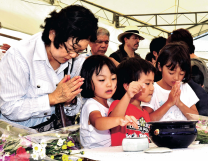Okinawa Memorial Day Ceremony attendees vow peace and object to Okinawa made scapegoat

Attendees of the Okinawa Memorial Day Ceremony on June 23 at Peace Memorial Park burn incense, vowing to create peace that will persist through the generations. (Photograph taken by Masatoshi Moromizato.)
June 24, 2016 Ryukyu Shimpo
At Peace Memorial Park in Mabuni, Itoman City, where the final fight of the Battle of Okinawa took place, the Okinawa Prefectural Government and the Prefectural Assembly held the Okinawa Memorial Day Ceremony on June 23, the 71st anniversary of the end of the battle. At the ceremony, participants prayed for the 200,000 people who became victims in the battle, and vowed to create lasting peace worldwide. Prayers and requiem masses were offered at memorial services held in memorial towers throughout Okinawa.
This is the first Okinawa Memorial Day since the security legislation that allows the right to collective self-defense came into effect. This is a significant shift toward change from a Japan that had renounced war, meaning a continued concentration of U.S. base land in Okinawa and the recurrence of base-related incidents and accidents. The participants and bereaved families that attended memorial services held in the Peace Park and elsewhere demanded peace with messages such as: “I want the country to never make war again,” and “do not make Okinawa a scapegoat anymore.”
Governor Takeshi Onaga made a peace declaration at the Memorial Day Ceremony and spoke for Okinawans, saying that the rape and murder of an Okinawan woman by a U.S. base employee “greatly shocked Okinawans, who are feeling insecure and deeply resentful.” In addition, he requested that the governments of the U.S. and Japan listen to Okinawans’ strong demands for “drastic revision of the U.S.-Japan Status of Forces Agreement, reduction and realignment of U.S. military bases including a curtailment of the Marine Corps, and immediate implementation of a reduction of [Okinawa’s] overlarge share of the base burden.”
Chairman of the Okinawa Prefectural Assembly, Masaharu Kina, also highlighted the current state of Okinawa having become a scapegoat for incidents and accidents due to the presence of U.S. military bases. He did so by describing that Including the period of Government of the Ryukyu Islands’ legislative branch following the war, 511 written opinions and resolutions for Okinawans’ dignity and human rights issues related to U.S. military bases have come through the Okinawa Prefectural Assembly.
Deep resentment regarding incidents including views such as, “the limits of our patience are being exceeded” were expressed at the memorial services throughout Okinawa.
According to the organizers, 4,700 people attended the Memorial Day Ceremony. Prime Minister Shinzo Abe, Speaker of the House of Representatives Tadamori Oshima, President of the House of Councilors Masaaki Yamazaki, Minister for Foreign Affairs Fumio Kishida, Minister of Defense Gen Nakatani, U.S. Ambassador to Japan Caroline Kennedy, and other cabinet ministers and ambassadors attended. At noon, ceremony attendees offered one minute of silence.
Prime Minister Abe said that even now, more the 70 years since the end of the war and faced with the heavy reality that Okinawa bears a large base burden, Japan will tackle base burden reduction from here on out.
This year 84 new names have been engraved on the Cornerstone of Peace at Peace Memorial Park, making 241,414 engraved names to date. Bereaved families of those who were involved in the Battle of Okinawa, now reaching old age, brought offerings of food and water to those represented at the monument.
Previous Article:All Okinawa Kaigi demands Japanese Government withdrawal of US marines from Okinawa
Next Article:Editorial: In declaration, Governor Onaga calls for protection of human rights and peace
[Similar Articles]
- People renew their commitment to create peace on 70th anniversary of Battle of Okinawa
- Ceremony to mark 69th anniversary of the end of the Battle of Okinawa: pledge not to wage wars again
- Governor Onaga encourages unity against Henoko base at Okinawa Memorial Day Ceremony
- People vow to pass on lessons from tragedy
- Island-wide prayer calls for world peace
 Webcam(Kokusai Street)
Webcam(Kokusai Street)


